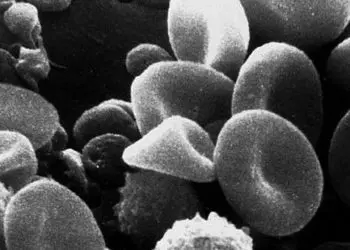Valoctocogene roxaparvovec gene therapy efficacious for hemophilia A treatment
1. The adeno-associated virus 5 (AAV5)-based gene therapy, valoctocogene roxaparvovec (AAV5-hFVIII-SQ), resulted in sustained factor VIII production, reduced bleeding rates, and need for factor VIII concentrate supplementation.
2. All participants experienced at least one adverse event, including headaches, nausea, and increased liver enzymes.
Evidence Rating Level: 1 (Excellent)
Study Rundown: Hemophilia A is an X-linked deficiency of coagulation factor VIII. Severe hemophilia A, characterized by factor VIII activity <1 international unit (IU)/dL, causes soft tissue bleeding and hemophilic arthropathy. Existing prophylactic therapies have improved these outcomes, but breakthrough hemorrhages still occur. Valoctocogene roxaparvovec (Valrox) is a gene therapy transducing a modified human factor VIII encoding sequence, which has been shown in phase 1-2 trials to provide sustained endogenous factor VIII production. The current phase 3 trial is to evaluate the efficacy and safety of valrox in men with severe hemophilia A. The gene therapy was given as a one-time infusion and endpoints were assessed at 49 to 52 weeks after treatment. It was found that participants achieved an elevated endogenous factor VIII activity level, along with significantly reduced bleeding events and the need for factor VIII concentrate. The most common adverse events were headaches, nausea, and increased liver enzymes such as alanine aminotransferase. This study showed that valrox was efficacious in providing endogenous factor VIII production and reducing disease burden for severe hemophilia A patients with a favorable safety profile.
Click here to read the study in NEJM
Relevant Reading: Multiyear Follow-up of AAV5-hFVIII-SQ Gene Therapy for Hemophilia A
In-Depth [randomized controlled trial]: The current study was an open-label, single-group, multi-center phase 3 trial evaluating the efficacy and safety of valrox in men with severe hemophilia A. Male patients with severe hemophilia A at least 18 years of age or older, who did not have anti-AAV5 antibodies or a history of factor VIII inhibitors production and who had been on prophylactic factor VIII concentration, were included in the study. Other exclusion criteria included HIV infection and substantial liver disease. Overall, 132 participants were enrolled (including 112 participants from a previous trial), received a valrox infusion of 6×1013 vector genomes/kg body weight, and completed more than 51 weeks of follow-up and assessment. The primary outcome was the change from baseline in factor VIII activity at 49 to 52 weeks after treatment. Secondary outcomes included changes from baseline in annualized factor VIII concentrate use and treated bleeding events. The mean change from baseline, which was below the detection limit and imputed as 1 IU/dL, in factor VIII activity level, at weeks 49 through to 52 following the infusion, was 41.9 IU/dL (95% confidence interval [CI], 34.1 to 49.7; P<0.001). The median change of factor VIII activity was 22.9 IU/dL (interquartile range, 10.9 to 61.3). In the rollover of 112 participants, after week 4, the mean and median annualized factor VIII concentrate use was 56.9 IU/kg/year (98% reduction from baseline; P<0.001) and 0 IU/kg/year. The mean and median annualized factor VIII infusion frequency, at 4 weeks after infusion, was 2.0 (98.6% reduction) and 0 infusions per year. The mean change from baseline in bleeding rates was -4.1 bleeds per year (95% CI, -5.3 to -2.8), which equated to an 83.8% reduction and was considered superior to factor VIII prophylactic therapy (P<0.001). All study participants experienced at least one adverse event – including increased alanine aminotransferase (85.8% of participants), headache (38.1%), nausea (37.3%), and increased aspartate aminotransferase (35.1%); 5 (3.7%) experienced serious adverse events attributable to the study drug. No participants died, reported thromboembolism, or withdrew due to adverse events, and none developed factor VIII inhibitors. The highly prevalent alanine aminotransferase elevation was largely resolved by glucocorticoids. The results showed that within the follow-up period, valrox resulted in a significant increase in endogenous factor VIII production and activity, as well as substantially reduced bleeding episodes and the need for exogenous factor VIII supplementation. The study noted favorable risk-benefit profiles and the plan for long-term evaluation of therapy durability.
Image: PD
©2022 2 Minute Medicine, Inc. All rights reserved. No works may be reproduced without expressed written consent from 2 Minute Medicine, Inc. Inquire about licensing here. No article should be construed as medical advice and is not intended as such by the authors or by 2 Minute Medicine, Inc.







